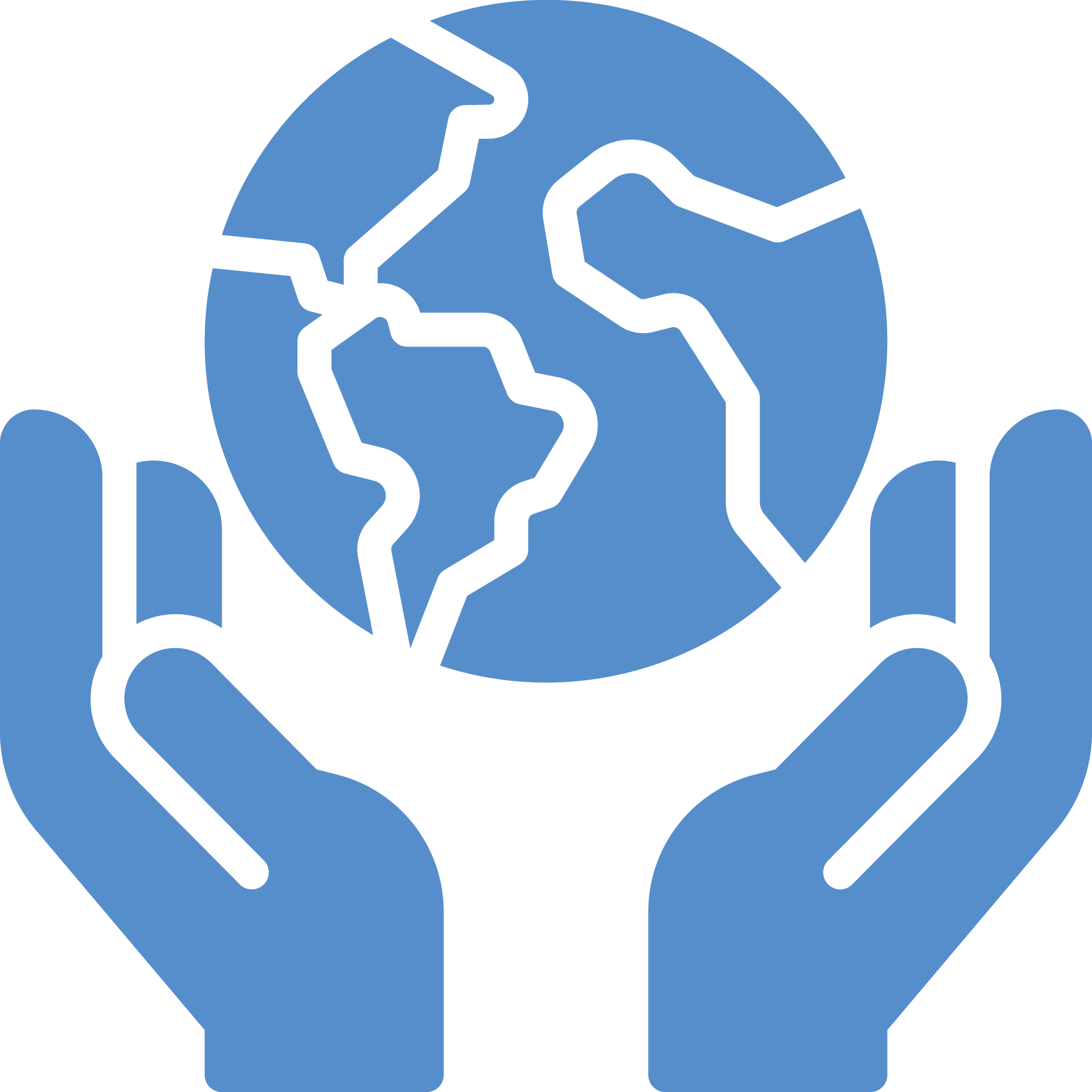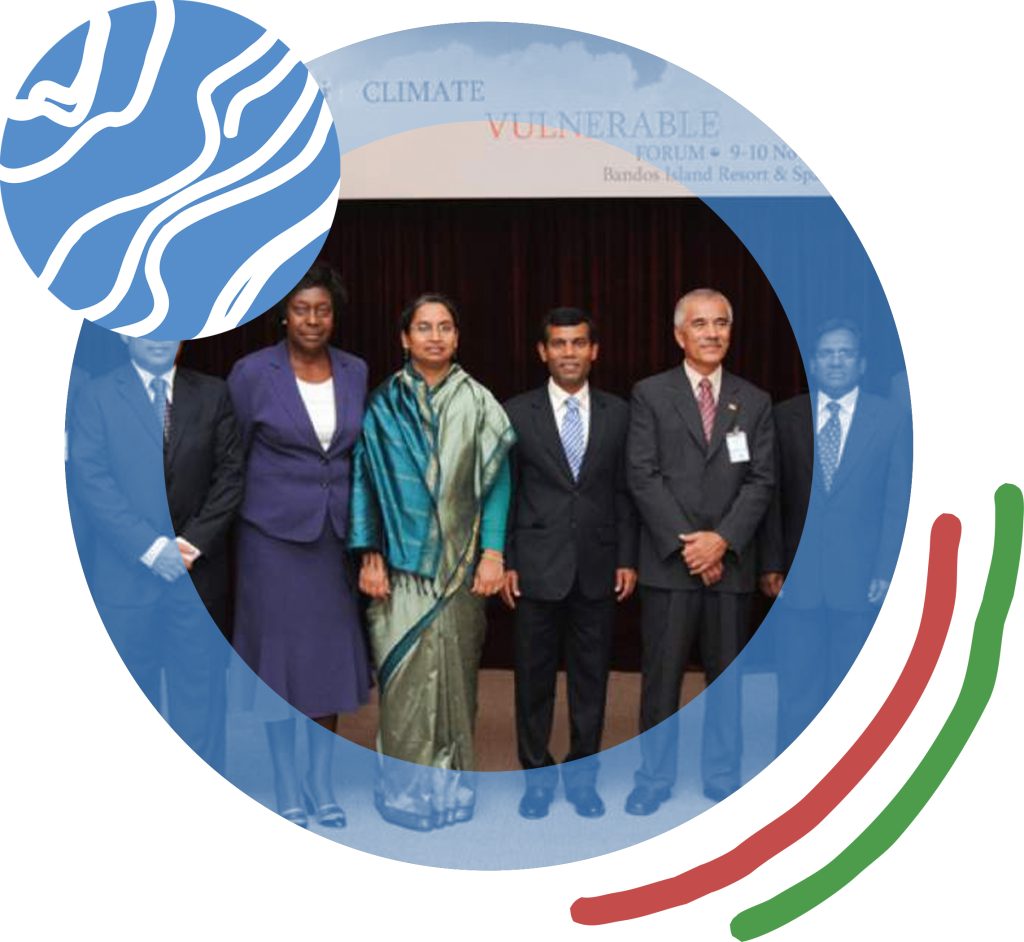HISTORY
The Climate Vulnerable Forum and V20 Finance Ministers (CVF-V20) is an international partnership of 74 countries highly vulnerable to a warming planet. Serving as a South-South cooperation platform, it unites member governments to act together to achieve long-term climate resilience and prosperity.
Today, the CVF-V20 stands strong with 74 member countries from Africa, Asia, the Caribbean, Latin America, the Middle East, and the Pacific, representing 1.81 billion people or 22.4% of the global population, and contributing 3.83% (equivalent to USD 4.1 trillion) of global GDP. Collectively, these nations contribute only 7.3% of global emissions, yet they face some of the most severe climate impacts.
The CVF-V20 advocates for “development-positive climate action,” a concept built on the following principles:

Climate-vulnerable countries must prioritize long-term development while addressing the urgency of addressing climate change.

The true success of climate action lies in empowering vulnerable countries to achieve prosperity and meet their development goals.

Accelerated progress towards Sustainable Development Goals (SDGs) will act as a catalyst for more ambitious, transformative, and long-lasting climate solutions.

ESTABLISHMENT

The CVF was established in 2009 when eleven of the world’s most climate-vulnerable nations convened in Malé, the capital of the Maldives, to strategize on amplifying their collective voice ahead of the upcoming 15th Session of the Conference of the Parties to the United Nations Framework Convention on Climate Change (COP15) in Copenhagen. The meeting, initiated by then-President of the Maldives, H.E. Mohamed Nasheed, aimed to strengthen unity among vulnerable states and advocate for greater representation in global climate negotiations.
The CVF aims to:

Promote ambitious action to tackle climate change by the international community as well as domestically within member countries;

Commission studies, research, and data to guide and inform the response to climate change; and

Build awareness and support for actions to safeguard the world’s most vulnerable.

The V20 Finance Ministers is the dedicated dialogue and action-oriented platform of the Finance Ministers of CVF member countries to translate its development-positive climate action agenda into real economy financing, investments, and outcomes. It aims to promote Climate Prosperity with ambitious economic and financial resilience strategies that advance the Sustainable Development Goals, 30×30 Global Biodiversity, and the 1.5°C safety threshold of the Paris Agreement. The V20 was established in October 2015 in Lima, Peru in conjunction with the Annual Meetings of the World Bank Group and International Monetary Fund.
The V20 aims to:

Promote the mobilization of public and private climate finance;

Share and exchange best practices on economic and financial aspects of climate action; and

Develop new and improved approaches to climate finance.

PRIORITY AREAS
As the climate crisis escalates, the CVF-V20 is advancing urgent action across the following priority areas:
Strengthening Global Financial Safety Net
A significant increase in pre-arranged and shock-resilient financing for climate-vulnerable nations is needed to strengthen the Global Financial Safety Net (GFSN). The goal is to raise the share of pre-arranged crisis finance from less than 2% in 2022 to 20% by 2030, with a further doubling thereafter. This is crucial as less than 1.4% of crisis financing currently reaches low-income countries.
Debt Sustainability
To achieve debt sustainability, the need for concessional capital and strategic debt relief must be central to all debt sustainability assessments. Currently, these factors are often obscured by technical details.
Carbon Market Access
Voluntary and compliance carbon markets hold potential, but they require predictability and integrity for improved price discovery and to attract private capital. This requires clear market signals, robust methodologies, and reliable pricing mechanisms to encourage private sector investment.
Cost of Capital and Local Currency Financing
Adjusting capital adequacy rules is important to lower the cost of capital and boost private investment in sustainable infrastructure. Lowering the cost of borrowing and increasing the availability of local currency financing are crucial for vulnerable economies.
Science and Health Agenda
This agenda focuses on six core areas:
- Tracking the real-time global warming and assessing the economic and ecological implications of breaching the 1.5 degrees threshold
- Operationalizing a climate vulnerability definition
- Building capacity to engage in and contribute to debates surrounding solar geoengineering technologies
- Developing policies to "shock-proof" health systems against the rise of vector-borne diseases and extreme heat-related health issues
- Facilitating information exchange about coral protection and restoration, as the first global biome tipping point
MILESTONES
| June 2022 | The V20 launched the first Climate Vulnerable Economies Loss Report, estimating the economic losses attributable to climate change. |
| October 2022 | The V20 Debt Review was launched, providing a detailed look at the V20’s debt profile. This policy brief is crucial to devising a global debt workout and coordinated response that places climate change and vulnerable nations at the center. |
| November 2022 | The third edition of the Climate Vulnerability Monitor entitled “A Planet On Fire” was published, detailing the current and future effects of climate change on the environment, economy, and public health at a national level. Ghana, Bangladesh, and Sri Lanka share their Climate Prosperity Plans at the UN climate conference in Sharm El Sheik (COP27). The V20 and G7 launched the Global Shield against Climate Risks as a financial protection cooperation that will accelerate pre-arranged financing at speed and scale. Initial contributions include around EUR 170 million from Germany and more than EUR 40 million from other countries. |
| April 2023 | The V20 established an office in Washington D.C. to engage the Bretton Woods Initiative. |
| September 2023 | CVF leaders meeting at UNGA 78 confirmed the operationalization of the independent CVF and V20 Secretariat, including for Ghana to host the headquarters and Sri Lanka to host a regional office. |
| April 2020 | Bangladesh assumed the presidency for the second time in April 2020, taking over from the Marshall Islands amidst the global COVID-19 pandemic. |
| September 2020 | The presidency of Bangladesh appointed the first five CVF thematic ambassadors. |
| October 2020 | The CVF’s Midnight Survival Deadline for the Climate (#MidnightClimateSurvival), was launched to remind governments of the obligations they had taken on at COP21. The CVF monitored in real time each NDC submitted up until the end of 2020, specifically through midnight on December 31. The CVF linked this deadline and national NDCs to survival because of the quickly closing window of opportunity to limit warming within the bounds of Paris Agreement goals, together with the accelerating stresses and impacts linked to the fast-changing climate. |
| December 2020 | The CVF and V20 created its Joint Multi-Donor Fund to support members in their climate action and advocacy. The V20 also unveiled its new Climate Prosperity Plan, a manifesto for the transformation of the global economy, as the threat of climate change looms over them. |
| July 2021 | V20 hosted the 1st Climate Vulnerable Finance Summit underpinning the early strategy of engaging with the IMF through the V20 Climate Prosperity Recovery Agenda and launch of the G24-V20 Task Force on Climate, Development and IMF towards a joint research agenda. |
| October 2021 | The creation of a new Special Rapporteur on the promotion and protection of human rights in the context of climate change was positively voted on at the UN Human Rights Council. CVF under the Bangladesh Presidency launched the Climate Vulnerable Forum Global Parliamentary Group (CVF GPG). V20 issued recommendations for the creation of the Resilience and Sustainability Trust, including how it can support debt restructuring efforts in climate-vulnerable countries. The IMF Executive Board approved the RST in April 2022. |
| November 2021 | IDF and V20 announced a global public-private partnership in risk analytics – the Global Risk Modelling Alliance (GRMA). V20’s Sustainable Insurance Facility becomes operational with financial support from Germany (BMZ) and the Asian Development Bank. |
| November 2018 | The CVF’s first online intergovernmental meeting was held, with the participation of heads of government. |
| October 2019 | The Global Center on Adaptation became the CVF and V20 Managing Partner and Secretariat host. |
| November 2016 | The Low Carbon Monitor report entitled “Pursuing the 1.5ºC limit: Benefits and Opportunities” was launched. The CVF High-Level Meeting at the UN climate change conference in Marrakech (COP22), launching CVF Vision and its 100% Renewable Energy target. |
| October 2015 | The V20 was officially founded in Lima, Peru in conjunction with the 2015 Annual Meetings of the World Bank Group and the IMF. |
| November 2015 | The 2015 CVF Meeting at the UN Climate Conference in Paris in November 2015, where the CVF Manila-Paris Declaration and the CVF 2016-2018 Roadmap were adopted. |
| April 2016 | The report entitled “Climate Change and Labour: Impacts of Heat in the Workplace” in partnership with the International Labor Organization was published. |
| June 2016 | At the end of the Philippines’ tenure, the campaign “1.5ºC: A Record We Must Not Break” was launched in the context of the Olympic Games of Rio. |
| November 2013 | The CVF Costa Rica Action Plan for 2013-2015 was released at the UN Climate Conference in Warsaw (COP19), detailing joint efforts of the members to advance international climate policy. Costa Rica also hosted the first CVF regional activity in April 2014. |
| November 2011 | At a major gathering in Dhaka, the CVF adopted a second 14-point Declaration, with the participation of UN Secretary-General Ban Ki-moon. |
| September 2012 | Alongside the opening of the 67th UN General Assembly in New York, the CVF launched its first Trust Fund administered by the United Nations Development Programme and the second edition of the Climate Vulnerability Monitor entitled “A Guide to the Cold Calculus of a Hot Planet.” |
| November 2010 | The Tarawa Climate Change Conference was held, where a number of CVF member countries adopted the Ambo Declaration together with other governments, ahead of the UN climate conference at Cancún (COP16). The CVF also issued its first Climate Vulnerability Monitor report entitled “The State of the Climate Crisis.” This report highlighted the growing body of scientific evidence documenting the severe social and economic impacts of ongoing climate change. |
| November 2009 | The CVF held its inaugural meeting in Malé, Maldives, just before the UN climate change conference (COP15) in Copenhagen. This gathering of leaders from 11 highly climate-vulnerable countries resulted in the adoption of a founding Declaration expressing deep concern about the rapid pace of climate change caused by human activity. |
